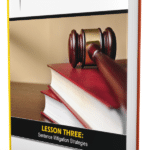How To Get A Shorter Federal Prison Term
Hi, I am Justin Paperny with White Collar Advice. It’s good to be back with you, and back on YouTube. I think it’s been five or six weeks since I’ve filmed a video, but I have a good reason!

How To Get A Shorter Federal Prison Term
And the answer to why actually comes from a question I received a couple of days ago. Someone who watches my videos asked me where the normal paintings or pictures I had behind me that I used to have in my office and in most of my videos. I responded and told him, as I tell you, that I had to replace those with my old USC baseball jersey–I love to relive the glory days from 20 years ago.
Those Norman Rockwell paintings have been moved upstairs because my wife and I had a little boy. His name is Jason, born May 29th, and those paintings were in my room when I was growing born, and now they’re in my son’s room. Proudly, they’ve been relocated. And to fill out the wall, and relive the glory days, my USC jersey is behind me.
It has been a busy time welcoming a new baby, thankfully my wife is phenomenal and awesome, and doing a lot of long nights. To the extent that I can help I certainly help, but it does feel good to get back to work, so to speak, and contributing content that I hope you find valuable. While adjusting back to work, I would like to share a story with you from June 22nd.
On June 22, I contributed to two conferences at the Fairmont Hotel in Santa Monica for the National Association of Criminal Defense Lawyers (NACDL). Naturally, I shared my thoughts on how to get a shorter federal prison term.
During the first conference, I had the privilege of sharing the panel with some of the top defense attorneys in the country, and also with a phenomenal federal public defender out of New Mexico. I shared my insights on sentencing mitigation, on how white collar defendants can take appropriate action to get a shorter federal prison term. Our companies, including Prison Professor and White Collar Advice, has worked with more than 1,000 white collar defendants over the last decade. In other words, we are in a unique and well-earned position to share our insights on how defendants can prepare So we had the lawyer’s perspective and the federal prison consultant’s perspective as we taught and addressed lawyers in the audience. It was, I think, a productive session.

How To Get A Shorter Federal Prison Term
In the afternoon, I contributed to the training of federal public defenders. I also had the privilege of speaking with Judge Benita Pearson from Ohio. I will share some of her sentiments from our presentation.
Specifically, she said to us, and to all the lawyers in the audience during our presentation, “Your job as the lawyer is to make us as smart as you possibly can about your client. If you’ve missed the opportunity, you’ve missed it.” And I want you to think about that. As you’re preparing for sentencing, are you doing everything you absolutely can to convey to the judge why you’re worthy of mercy?
During my presentation with Judge Pearson, I referenced a comment that Judge Bough made in a video that Michael Santos filmed with him where Judge Bough said about two percent of what influences him at sentencing comes from lawyers.
Two percent, which means the balance comes from the white-collar defendant. From you–from your mitigation effort. So that includes character reference letters, and compelling narratives, volunteer work, and working.
I shared a story at this conference of a client who went to an Ivy League school. Before his sentencing he drove for Uber. We used some of those Uber reviews and it impressed the judge, in part, because the judge knew about his education and background. Clearly, the judge saw that he wanted to build a new record as a law-abiding citizen and that he was willing to humble himself to work. Working is better than sitting at home all day. Are you willing to do whatever it takes? It’s one thing to say it, it’s another thing to do it.
Judge Pearson also said, “At the end of a sentencing, you should be tired knowing you’ve left it all out there.”
And she was speaking both to the defendant and the defense lawyer. You should be exhausted at the end of that sentencing. She said leading up to that sentencing, you need to be working. You need to be creating a new record and demonstrating through your own efforts why you’re worthy of the best outcome. Judges are going to know if you did the work.
I asked her, in front of everyone, “Is it true that I heard in federal prison, or is it your opinion that perhaps some judges don’t read letters, or perhaps the letters are too long, and they’re not going to be read?” I’m talking about narratives, and character reference letters, because I heard that every day in federal prison.
I hear it now as federal prison consultant. “Justin, I’m not going to write a letter, the judge isn’t going to read it. It’s a waste of time, it’s a formality, this is a conservative judge that’s been doing it for 30 years, nothing’s going to move the needle.” If that is how you feel, we cannot help you.
If you’re gonna default to, “There’s nothing I can do to get a shorter prison term,” well then, you’re not going to do anything. There’s this unique commonality between a pessimist and an optimist. A pessimist says, “Nothing matters,”. An optimist says, “Everything’s going to work out, so what’s the point, everything’s gonna work out.” So in both cases, neither may work to get a better outcome. Odd, but true.
So, too much pessimism and too much optimism are really not good things. I’m of the opinion that you need to work, and Judge Pearson confirmed exactly that.
You should be exhausted at your sentencing because it should be a full-time job. And anyone that’s going to work with us, and if you were to speak with any clients, and if you were considering retaining our company, you should speak with our clients, it’s exhausting. It’s a full-time job, on top of the full-time job you may already have.
But if you want really want to get a shorter federal prison term in the most favorable institution, you will have to work hard. You should be exhausted getting there and Judge Pearson said exactly that at sentencing.
She also said sentencing videos are essential. In fact, we preview a sentencing video prior to our presentation, and since the 22nd of June, it’s now July 6th, we’re working on four new sentencing videos for four clients. I’m gonna be traveling throughout Southern California, a colleague on my team is gonna be leaving the state to interview and film clients for the day. We are going to create these compelling sentencing videos that will augment the narrative.
Judge Pearson said, “Sentencing videos are the wave of the future, everyone should have one.” And a lawyer in the audience said, “But my judge won’t watch it, I’ve never done it before.” And Judge Pearson said, “If you don’t think your judge will watch it, show it anyway because in time it’s going to be the norm.”
Now, your lawyer may be against a narrative. Your lawyer may be against a sentencing video. If they say they don’t want to do it because they have never done it before, you’ve got to have the skillset to ask the right questions, the followup questions. Just because they’ve never done it before, does that mean it’s the right reason?
Offer some specifics. Ask the right questions to determine why it might not be in your interest. Is it potentially fees the law firm would rather collect? Are there specific comments that the judge may have said in the past that would preclude you from a narrative or a video? For example, I know a video that would look like a Hollywood production could be off putting to a judge because the judge may think you’re a rich guy trying to buy yourself out of jail. Well, it’s gotta be done strategically. It’s mostly photos, it’s … Just takes time. You’re telling a story with your video. So I’m proud to be working on a number of videos, and I’ve brought someone onto our team to help move this process forward.

How To Get A Shorter Federal Prison Term
And wrapping up with Judge Pearson, onstage with her, it was very affirming to hear her applaud our work in front of so many lawyers and to say that our work matters. To say that defendants can take matters into their own hands, and convince and persuade a judge, presuming they put in the work.
I’ll close with something that I asked her onstage. I said, “Judge Pearson, I’ve worked with hundreds of white collar defendants people have had privilege, like me, and went to really great schools. They had a had a lot of opportunities in life, a lot of privilege, and sometimes in a narrative, they’re afraid to open up about their background, and the privileges they had. Many do not want to discuss all the influences in their life, including the success they have had. They fear because it could persuade a judge to unnecessarily punish them by saying.
Then I said, “Should defendants be scared?”
She said, “I need to know everything, Justin. I need to know everything about the defendant.” She continued, “Justin, let me make this point. Even if a defendant had privilege and opportunity, there were some fractures along the way that could have compelled them to break the law. What are those fractures?”
And it was so interesting to hear. I thought about some of the fractures in my life, despite the privilege and opportunity. I thought, “In 1993 my parents got divorced, and then there were the Rodney King riots that destroyed my father’s business, and he went through some financial hardships. For a while, I regretted going to USC because I didn’t think my parents could afford it, and I didn’t have enough of a scholarship from baseball, and then I was so driven to make money. So I thought about some of these fractures as Judge Pearson spoke.

How To Get A Shorter Federal Prison Term
Maybe none of the fractures compared to what you’ve had in your life. You may listen to this and say, “My God, Justin has not really had fractures in his life.” Well, they’re fractures to me. It’s a big deal to me. I used to tell my partner Michael Santos, “You must laugh at me that I get 18 months, you’re doing 45 years.” He’d say, “Justin, 18 months is significant for you. It’s severe, and I totally understand it.”
My fractures are my own. The point is if you want to get a shorter federal prison term articulate them to a judge, whatever they may be.
And that’s how I’ll close. For us to help you, if you’re going to opt in to get our resources, just don’t read them. Implement what we teach you. Take the time to express to a judge through a video, through a narrative, who you are, what you’ve learned, why you’re working to build a new record and how you’ll become better through this experience. If you do, as I took from my notes while onstage with Judge Pearson, you will leave that sentencing hearing utterly exhausted. You will be drained, knowing there’s nothing more you could have done to prepare. You will have dignity and self-esteem knowing you’ve worked your ass off on days you’d rather do anything else.
Thank you all for your time … Oh, lastly, if you’d like to see an example of a sentencing video, send an email to jp@whitecollaradvice.com. I will send you an example of a sentencing video in case it’s something you want to do as you approach your sentencing.
Be well,
Justin Paperny
P.S. If you want to talk, call me at 818-424-2220 or schedule a call here.




